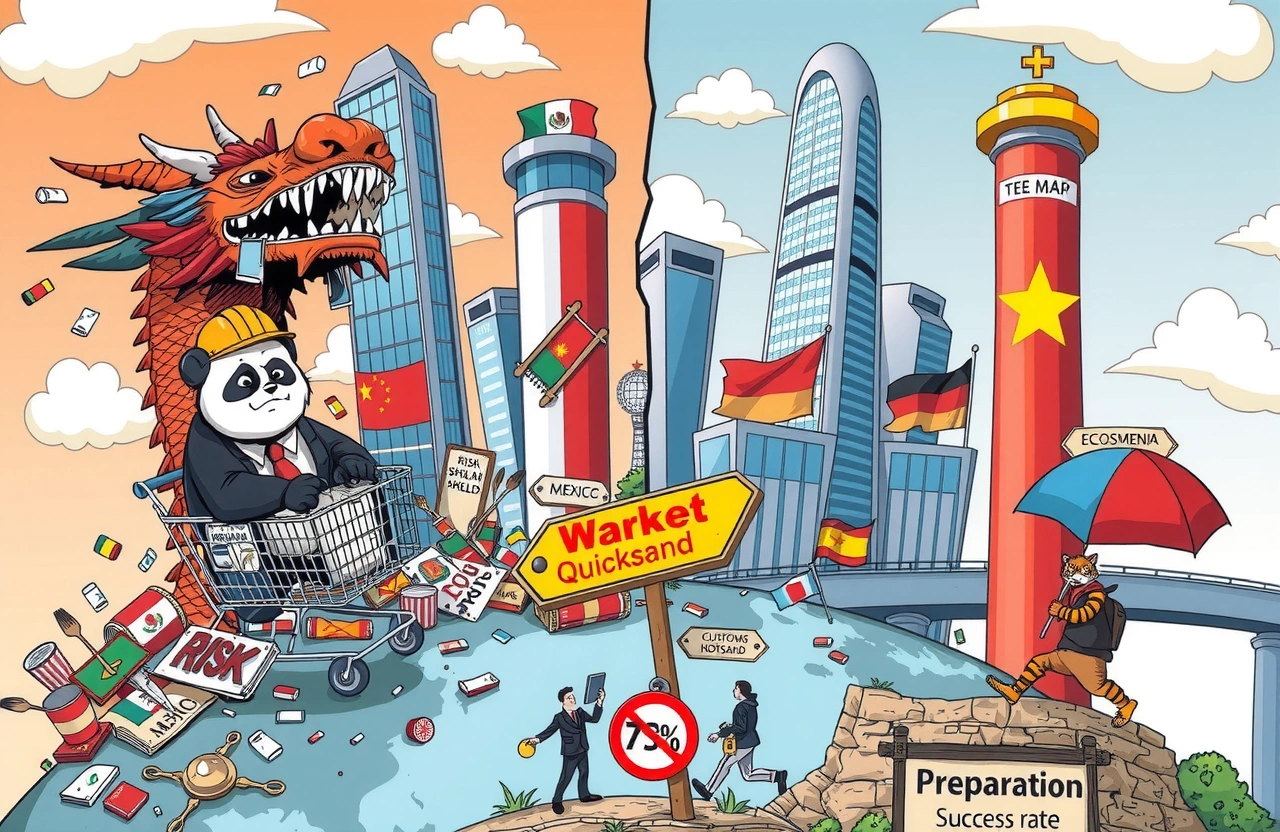The Global Expansion Imperative
‘Not going global means falling behind’ has become a rallying cry across China’s boardrooms. As domestic competition intensifies, international markets appear as the promised land for growth-hungry enterprises. Recent data confirms this trend: Chinese overseas investment stock has surpassed $2.9 trillion, with cumulative engineering contracts exceeding $3 trillion since the Belt and Road Initiative launched. Yet former Ministry of Commerce official Ma She, speaking at the 2025 China Enterprise Globalization Summit, delivered a sobering warning. What many see as a survival imperative often becomes an immediate downfall when executed blindly. The very companies trumpeting ‘not going global means falling behind’ frequently discover that inadequate preparation converts opportunity into a costly collapse upon entry into foreign markets.
The Hidden Pitfalls Lurking Beneath Expansion Fever
Intelligence Failures: Charting with Broken Compasses
Information gaps plague nearly 70% of first-time exporters according to China Council survey data. Many companies rely on fragmentary intelligence from non-professional sources:
– Vietnamese manufacturing ‘opportunities’ that ignore localization requirements
– Mexican export advantages that crumble under customs scrutiny
– Worker protection regulations in Europe making staff reductions economically untenable
These intelligence failures directly enable the dreaded collapse upon entry phenomenon. Without verified market intelligence, companies allocate resources based on dangerously incomplete pictures.
The Experience Gap: Domestic Success ≠ Global Competence
Companies frequently transplant domestic operational models that fail spectacularly abroad. The Chinese Academy of International Trade cites 43% of overseas failures stem from management-system incompatibility. Critical disconnects include:
– Labor law variations making HR policies obsolete
– Supply chain infrastructures demanding different logistics approaches
– Negotiation styles causing relationship breakdowns
A garment manufacturer learned this painfully when German unions challenged their staffing model, stalling production for nine months.
Infrastructure Breakdowns: Navigating Without Support
China’s corporate support ecosystem remains underdeveloped for global operations:
– Only 28% of SMEs access specialized international legal counsel
– Cross-border payment systems create cash flow bottlenecks
– Few insurers underwriting political risk in emerging markets
The World Bank notes nations with robust export service frameworks see 40% higher success rates. Without these, companies shouting ‘not going global means falling behind’ have little but enthusiasm to sustain them.
Evolving Global Risk Landscapes
The New Geopolitical Minefield
Modern international expansion navigates unprecedented political currents:
– ‘Small yard, high fence’ policies restricting Chinese tech investments
– Environmental regulations weaponized as trade barriers
– Customized sanctions against specific industries
Companies that embraced ‘not going global means falling behind’ now face complex compliance matrices. Europe’s carbon border tax alone adds average 20% operational overhead. The U.S. CHIPS Act reshaped semiconductor investment calculus overnight, proving geopolitical conditions now shift without warning.
When Conflict Redraws the Map
Ground realities transform faster than business plans. The ripple effects illustrate why ‘not going global means falling behind’ needs strategic depth:
– Ukrainian grain routes disruption triggering African food supply emergencies
– Red Sea shipping attacks necessitating $2 million monthly security budgets
– Neighboring market instability from regional conflicts
Companies monitoring only stable corridors risk finding themselves trapped beside new front lines.
Building Bulletproof Expansion Frameworks
Pillar 1: Confidence Through Preparation
Counterintuitively, Ma She’s first prescription isn’t caution but conviction. Successful companies transform ‘not going global means falling behind’ from anxiety into opportunity by:
– Securing China Council for Trade Development exporter training
– Partnering with MOFCOM’s overseas commercial counselor offices for country briefings
– Accessing CSA Global Risk Database threat assessments
These tools convert uncertainty into navigable pathways. A Guangzhou robotics firm avoided Ukrainian disruption by rerouting through Türkiye using precisely such intelligence.
Pillar 2: Institutional Immunity Development
Risk-proof organizations build multilayered defenses:
– Project execution protocols incorporating ISO 31000 risk standards
– Compliance teams monitoring UNCTAD regulatory change alerts
– Localization depth bringing regional stakeholders into governance structures
Consider Hangzhou automobile components maker Wanxiang Group: By establishing joint oversight committees at their U.S. facilities, they circumvented union conflicts that sank three competitors. Their operational resilience proves that transformation of ‘not going global means falling behind’ beyond slogan requires embedding local DNA.
Pillar 3: Digital Risk Shields
Forward-thinking firms deploy technologies creating real-time immunity:
– AI platforms mapping political volatility via news sentiment algorithms
– Blockchain documentation reducing customs clearance times by 60%
– Logistics dashboards integrating weather, conflict and regulation data
Shanghai’s Gezhi Semiconductor credits IoT monitoring with detecting Mexican warehouse security breaches before losses occurred. Digital transformation converts ‘not going global means falling behind’ anxieties into predictive competencies.
Pillar 4: Ecosystem Reinforcement
Recent government initiatives offer critical scaffolding:
– Belt and Road financial instruments facilitating convertible currency solutions
– China Export Credit Insurance Corporation programs underwriting emerging market risks
– Digital Silk Road platforms sharing due diligence intelligence
SMEs accessing these resources through portals like the Outbound Investment Service Alliance report 75% better crisis response capabilities. This infrastructure turns ‘not going global means falling behind’ into actionable frameworks.
Transforming Slogans Into Sustainable Strategy
The urgency of ‘not going global means falling behind’ contains truth but demands sophistication. Companies ascending to global prominence demonstrate shared approaches:
– Vietnam entry preceded by 18-month cultural acclimatization programs
– Mexican facilities co-designed with local environmental regulators
– German operations governed with works council participation from day one
Moreover, consult resources:
– Harvard Business Review guide to cross-cultural management
– UNIDO Investment Promotion Program country profiles
– China Global Investment Tracker for success pattern analysis
These methodological defenses prevent the collapse upon entry scenario.
At its core, the ‘not going global means falling behind’ imperative remains vital. But survival belongs not to those rushing blindly overseas, but to enterprises building systemic resilience. By implementing Ma She’s prescriptive frameworks – confidence through preparation, institutional hardening, technological safeguarding, and ecosystem utilization – companies transform global ambitions from existential gamble to calculated expansion. Every successful international venture begins with this transformation. Start yours today by accessing Ministry of Commerce overseas investment toolkits and turning strategic vulnerability into competitive advantage.



